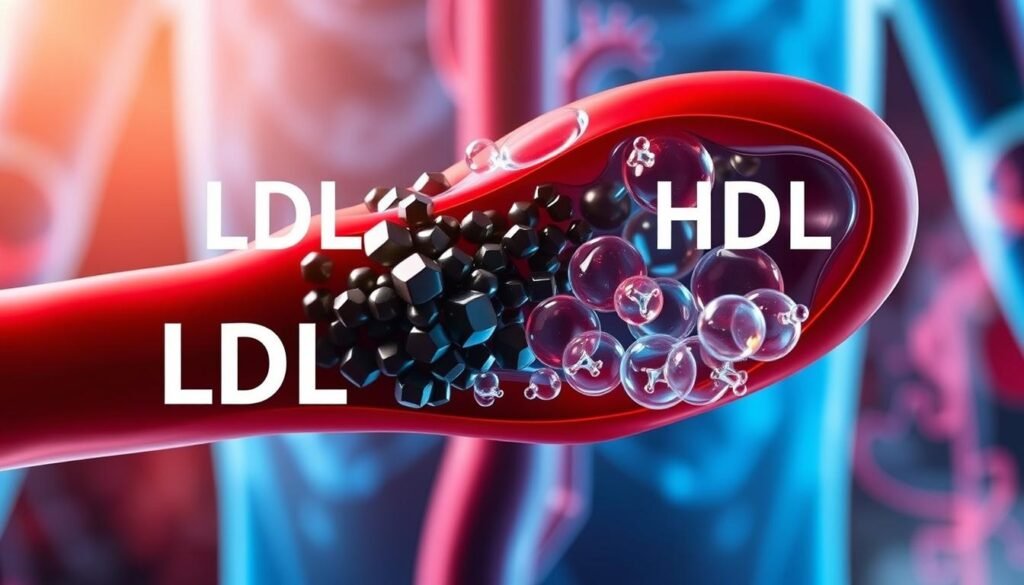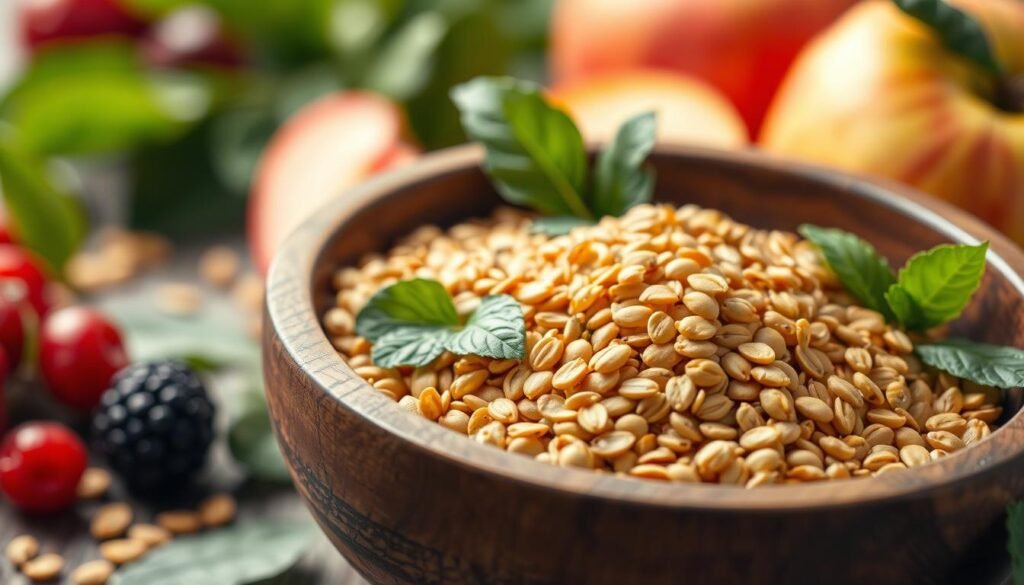Did you know a small step of adding a tablespoon of ground flaxseed to your daily diet can cut LDL cholesterol by 15%? This small seed is mighty, full of essential nutrients. It’s a superfood because it helps manage cholesterol and boost heart health. Packed with omega-3s, fiber, and lignans, flaxseed offers more than flavor. It’s a key part of a heart-healthy diet.
Key Takeaways
- Flaxseed can significantly lower LDL cholesterol levels, making it beneficial for heart health.
- One tablespoon of ground flaxseed is rich in essential nutrients, including fiber and omega-3 fatty acids.
- Regular flaxseed consumption may lead to reduced body weight and improved blood pressure.
- This superfood contains over 800 times more lignans than most other plant foods, providing potent antioxidant properties.
- Incorporating flaxseed into meals is simple and can enhance overall dietary fiber intake.
- Consult a healthcare provider before adding flaxseed to the diet, especially for those with specific health conditions.
Introduction to Flaxseed and Its Nutritional Benefits
Flaxseed is more than just a plant; it’s a historical powerhouse. It boasts a rich flaxseed history that dates back over 30,000 years. Initially grown for its fibers, flaxseed today is famed for its health benefits. It’s packed with nutrients that support heart health and overall well-being.
Historical Relevance of Flaxseed
From textiles to the table, flaxseed has come a long way. Civilizations like ancient Egypt and China first used it. Now, we celebrate flaxseed for the health perks it brings us.
Nutritional Composition: Vitamins and Minerals
Did you know flaxseed has about 534 calories per 3.5 ounces? But don’t let that scare you. Just a tablespoon has around 55 calories. It’s rich in fats, carbs, and proteins. Plus, most of its carbs are fiber, great for digestion.
Feeling full with flaxseed is easy. Just two tablespoons give you about 6 grams of dietary fiber. That’s up to 25% of what adults need daily! Flaxseed is also stacked with important vitamins and minerals. It includes thiamine, copper, and manganese. It’s a top source of omega-3s and lignans, boosting heart health and offering powerful antioxidants.
Understanding Cholesterol: Types and Impact on Health
Cholesterol is essential for our health, and it comes in two kinds: low-density lipoprotein (LDL) and high-density lipoprotein (HDL). Each type affects our heart differently. It’s important to know these differences to understand their roles in heart disease.
LDL vs. HDL Cholesterol
LDL cholesterol is the “bad” kind. It can build up in arteries, making them narrow. This increases the risk of heart disease and stroke. On the other hand, HDL is “good” cholesterol. It takes LDL cholesterol away from the arteries and out of the body. Balancing LDL and HDL levels is key for a healthy heart, especially since high LDL levels are dangerous.
The Importance of Maintaining Healthy Cholesterol Levels
Keeping an eye on cholesterol is crucial for stopping heart disease. High levels of LDL cholesterol can lead to serious problems like heart attacks and strokes. But high levels of HDL cholesterol can protect the heart. Health experts say keep total cholesterol under 200 mg/dL. LDL should be under 100 mg/dL, and HDL should be 60 mg/dL or more. Choosing the right foods can greatly affect your cholesterol and heart health.

| Cholesterol Type | Role | Recommended Levels |
|---|---|---|
| LDL Cholesterol | Can lead to plaque buildup | Below 100 mg/dL |
| HDL Cholesterol | Helps remove LDL cholesterol | Equal to or above 60 mg/dL |
| Total Cholesterol | Overall measure of cholesterol | Below 200 mg/dL |
Flaxseed and Cholesterol: Exploring the Connection
Flaxseed is well-known for its health benefits, especially in managing cholesterol levels. Regular flaxseed consumption can significantly improve cholesterol, offering a natural method to boost heart health. This is particularly true for LDL cholesterol, which is the bad kind.
How Flaxseed Affects LDL Cholesterol Levels
A study from Iowa State University’s Nutrition and Wellness Research Center found interesting results. People taking 150 milligrams of flaxseed lignans every day saw their LDL cholesterol drop by nearly 10 percent in three months. This shows that flaxseed consumption can be a real help in managing cholesterol levels, especially for men.
About 17 percent of Americans struggle with high blood cholesterol. This shines a light on how crucial diet changes, like adding flaxseed, can be. The study, involving 90 participants with high cholesterol, tested different quantities of flaxseed lignans to see their effects, proving its importance in diet planning.
Research Findings on Flaxseed Consumption and Cholesterol Reduction
These findings aren’t alone. Other research also supports flaxseed’s positive impact on heart health. Flaxseed not only improves cholesterol but also does so without harming bone health. This points to the wide-reaching benefits of flaxseed on cardiovascular health and wellness.
The soluble fiber in flaxseed plays a key part by interacting with bile acids. This helps lower cholesterol in the body, further proving flaxseed’s value. For more information on flaxseed and heart health, check out this detailed article.

| Study | Subjects | Flaxseed Amount | LDL Cholesterol Reduction |
|---|---|---|---|
| Iowa State University Study | 90 | 150 mg/day | ~10% |
| Peripheral Artery Disease Study | Varied | 30 g/day | ~15% |
| Hypertension Dietary Supplementation | Varied | Flaxseed fibers | Lowered blood pressure |
The Role of Omega-3 Fatty Acids in Heart Health
Omega-3 fatty acids are crucial for heart health. They help reduce inflammation, lower triglyceride levels, and prevent cholesterol from building up in arteries. Alpha-linolenic acid (ALA), a key omega-3, comes from plants. It’s great for those wanting to improve heart health naturally.
Alpha-Linolenic Acid (ALA) and Its Benefits
Our bodies can’t make alpha-linolenic acid (ALA), so we need to eat foods rich in it, like flaxseed. ALA is good for the heart. Research shows it helps lower the risk of heart disease. For more details on ALA, check out these studies.
Flaxseed vs. Fish Sources of Omega-3s
Flaxseed is a top source of ALA. But, fish provides omega-3s like EPA and DHA. These are found in oily fish such as salmon. Plant-based diets benefit from flaxseed. It’s an excellent way to get omega-3s without the mercury risks fish might have. To learn about cholesterol and heart health, see this article.
| Source of Omega-3s | Type of Omega-3s | Health Benefits |
|---|---|---|
| Flaxseed | Alpha-linolenic acid (ALA) | Supports heart health, reduces inflammation |
| Fish (e.g., salmon, mackerel) | Eicosapentaenoic acid (EPA), Docosahexaenoic acid (DHA) | Improves cardiovascular outcomes, lowers triglycerides |
| Chia Seeds | Alpha-linolenic acid (ALA) | Promotes heart health, aids in cholesterol management |
| Walnuts | Alpha-linolenic acid (ALA) | Supports heart health, contains antioxidants |
Fiber Content in Flaxseed and Its Effects on Cholesterol
Flaxseed is a powerhouse of dietary fiber that aids in managing cholesterol. It is packed with both soluble and insoluble fibers. These fibers offer benefits for heart health.
Soluble vs. Insoluble Fiber
Soluble fiber turns into a gel in the digestive tract. It helps lower cholesterol by binding with bile salts. With the bile salts gone, the body uses blood cholesterol instead, lowering its level. Insoluble fiber, however, helps with digestive health by making bowel movements regular.
How Fiber Binds to Bile Salts to Lower Cholesterol
Flaxseed’s mix of fiber is key to reducing cholesterol. Studies show one to two tablespoons of ground flaxseed daily can lower bad cholesterol. Adding flaxseed to your diet can boost cholesterol health and cut heart disease risks. Plus, there are two grams of fiber in every tablespoon, making it easy to include in your meals.

| Fiber Type | Description | Health Benefits |
|---|---|---|
| Soluble Fiber | Dissolves in water, forming a gel-like substance | Helps lower cholesterol, stabilizes blood sugar |
| Insoluble Fiber | Adds bulk to stool, does not dissolve in water | Promotes bowel regularity, enhances digestive health |
With its special fiber content, flaxseed not only tackles cholesterol but also promotes a healthier diet. This boosts heart health overall.
Plant Sterols and Their Role in Cholesterol Management
Keeping cholesterol in check is key for heart health. Plant sterols play a big role in this. They are similar to cholesterol, helping to cut down how much cholesterol our bodies take in. Studies show adding these to your diet can really drop bad cholesterol levels.
How Phytosterols Affect Cholesterol Absorption
Phytosterols beat out cholesterol for a spot in our intestines. This lowers the cholesterol that gets into our blood. The American Heart Association says eating two grams of sterols each day can drop bad cholesterol by 5% to 15%. This is a good move for your heart’s health.
Flaxseed as a Source of Plant Sterols
Flaxseed is a top choice for plant sterols. It’s packed with benefits, like omega-3 fats and sterols that lower cholesterol uptake. Adding flaxseed to your diet can really boost your heart health. To learn more about plant sterols, check out this resource.
Lignans: An Antioxidant Powerhouse
Lignans are special chemicals in flaxseed that boost health. They fight off free radicals, reducing oxidative stress. Flaxseed is a top source of lignans, more than most other foods. This gives it unique health perks we should look into.
What Are Lignans and Their Health Benefits?
Lignans not only act as antioxidants but also improve health in many ways. They’re good for the heart and help blood flow better. By taking lignans, you might lower your cholesterol and cut stroke risk. The soluble fiber in flaxseed also plays a part, slowing digestion and cutting down cholesterol and sugar intake.
Scientific Studies Linking Lignans to Cancer Prevention
Research shows lignans could help prevent cancer. They seem to especially reduce breast cancer risk in postmenopausal women. Adding flaxseed to your diet can be smart and simple for better health. With more flaxseed, you’ll see benefits like less inflammation and better blood sugar control. For more on flaxseed’s benefits, check out this comprehensive overview.
| Health Benefit | Effect of Lignans |
|---|---|
| Antioxidant Activity | Neutralizes free radicals |
| Cancer Prevention | May lower risk of breast cancer |
| Cholesterol Reduction | Helps lower LDL cholesterol |
| Improved Blood Flow | Enhances circulation and reduces stroke risk |
| Inflammation Reduction | May alleviate symptoms associated with chronic illnesses |
Incorporating Flaxseed into a Healthy Diet
Adding flaxseed to your daily meals boosts nutrition and supports health. It’s easy to mix into different dishes. You can choose from ground flaxseed, flaxseed oil, or flax milk to make your diet healthier. Just make sure to keep within the recommended daily amounts.
Simple Ways to Add Flaxseed to Daily Meals
- Add ground flaxseed to smoothies for a nutrient-rich boost.
- Sprinkle flaxseed on yogurt or oatmeal to enhance texture and nutrition.
- Incorporate flaxseed into baked goods like muffins and bread for added fiber.
- Use flaxseed oil in salad dressings for a flavorful and healthy alternative.
- Consider using flax milk in place of dairy or other plant-based milks.
Recommended Daily Intake of Flaxseed and Its Safety
It’s best to eat 1 to 2 tablespoons of ground flaxseed daily. This amount is enough for health benefits without risk. Make sure to grind flaxseed for better digestion, as whole seeds might not digest well. Also, drink plenty of water to avoid any digestive issues from flaxseed.
Conclusion
Flaxseed is a powerful superfood. It helps manage cholesterol and boosts heart health. Scientists say it can lower bad cholesterol in your diet.
Daily ground flaxseed reduces LDL cholesterol by up to 15%. This is great for heart health.
Flaxseed is packed with omega-3 fatty acids, fiber, and lignans. These ingredients lower cholesterol and improve health. This makes flaxseed a natural choice for heart wellness.
Adding flaxseed to your meals is easy and tasty. You can mix it into smoothies or put it on salads. Its health benefits make it popular among those focused on heart health.